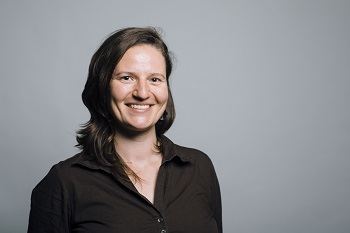Dr. Katrin Beer
Academic career
-
01/2022 – 01/2025: Research assistant in the research project “Power2U” (TU Munich)
-
09/2022 – 12/2023: Research assistant in the research project “SmartProSys” (OVGU Magdeburg)
-
10/2017 – 11/2023: Doctorate in political science, Dr. rer. pol. (OVGU Magdeburg)
-
07/2021 – 11/2022: Freelance work: Social science research on bioenergy villages in Germany (EIFER/KIT)
-
05/2020 – 09/2022: Teaching assignments at the OVGU Magdeburg (Social Sciences Bachelor, Lecture Series Sustainability) and the FernUniversität in Hagen (Environmental Sciences Master)
-
04/2017 – 04/2020: Research assistant in the research project “Bio-Ökopoli” (OVGU Magdeburg)
-
11/2016 – 01/2017: Freelance work: Social science research on PPGIS (EIFER/KIT)
-
10/2012 – 03/2016: Master studies Geography of Global Change, M.Sc. (Albert-Ludwigs-University Freiburg)
-
10/2008 – 11/2012: Bachelor studies Ethnology (HF), Geography (NF), Linguistics of German (NF), B.A. (Albert-Ludwigs-University Freiburg)
- Sustainable bioeconomy, focus on bioenergy
- Energy transition and energy policy in Germany
- Sustainability transformation of the chemical industry
- Science communication and open science
- Sustainability sciences
- Qualitative social research
- Policy analysis
Selection
Beer, K. (2022). Problem Structures of Bioenergy Policy in the Power and Heat Sector in Germany. In D. Lanzerath, U. Schurr, C. Pinsdorf, & M. Stake (Eds.), Springer eBook Collection. Bioeconomy and Sustainability: Perspectives from Natural and Social Sciences, Economics and Ethics (1st ed., pp. 137–156). Springer International Publishing; Imprint Springer. https://doi.org/10.1007/978-3-030-87402-5_21
Perbandt, D., Vogelpohl, T., Beer, K., Töller, A. E., & Böcher, M. (2021). Zielkonflikte der Bioökonomie: Biobasiertes Wirtschaften im Spannungsfeld von Ökonomie und Ökologie. Springer eBook Collection. Springer. https://doi.org/10.1007/978-3-658-35093-2
Vogelpohl, T., Beer, K., Ewert, B., Perbandt, D., Töller, A. E., & Böcher, M. (2021). Patterns of European bioeconomy policy. Insights from a cross-case study of three policy areas. Environmental Politics, 1–21. https://doi.org/10.1080/09644016.2021.1917827
Otto, S., Hildebrandt, J., Will, M., Henn, L., & Beer, K. (2021). Tying Up Loose Ends. Integrating Consumers’ Psychology into a Broad Interdisciplinary Perspective on a Circular Sustainable Bioeconomy. Journal of Agricultural and Environmental Ethics, 34(2). https://doi.org/10.1007/s10806-021-09851-6
Böcher, M., Töller, A. E., Perbandt, D., Beer, K., & Vogelpohl, T. (2020). Research trends: Bioeconomy politics and governance. Forest Policy and Economics, 118, 102219. https://doi.org/10.1016/j.forpol.2020.102219
All publications: click here.
Completed projects
SmartProSys Research Cluster
Duration: 01.09.2022 to 31.12.2023
The Magdeburg research initiative SmartProSys (Smart Process Systems Engineering) researches methods and approaches for the transformation of chemical and biotechnological production processes towards a sustainable circular economy.
Scientists from the fields of logistics, mathematics, sociology, political science and psychology are involved in SmartProSys.
The research network pursues the goal of excellence as defined by the Excellence Initiative of the German federal and state governments. The Chair is involved in the "Societal Support & Individual Appropriation" sub-cluster and is leading the sub-project: Institutional and technical options for transforming bioeconomy to circularity. New ways for decarbonization and de-fossilization through policy integration and novel conversion pathways.
This text was translated with DeepL
Dynamics of bioenergy policy in Germany. A policy field analysis against the background of bioeconomy, climate protection and circular economy (PhD project)
Duration: 01.10.2017 to 30.11.2023
The role of bioenergy in the energy system is being renegotiated at the beginning of the 2020s against the backdrop of debates on the bioeconomy, climate protection and the circular economy. This dissertation analyzes bioenergy policy in Germany from a political science perspective, on the one hand as a conceptual sub-area of the currently emerging bioeconomy policy and on the other hand as a regulatory field of the institutionally already established energy policy. The focus is on political processes in the electricity and heating sector in the period from 2000 to 2020. The work emerges from the research project "Political processes of the bioeconomy between economy and ecology - Bio-Ökopoli" (BMBF, funding line "Bioeconomy as social change") and aims to identify and describe specific dynamics of bioenergy policy in Germany on the basis of qualitative case studies at European, national and sub-national level.
The work is categorized as policy field analysis and political science sustainability research. It is based on literature and internet research, on theory-led, qualitative content analyses of transcribed expert interviews and primary documents as well as on the exchange with experts in the form of lectures, poster presentations and discussions at specialist events and beyond (method triangulation). Michael Böcher and Annette Elisabeth Töller's approach of self-dynamic political processes (AEP) serves as a theoretical framework. The analysis is presented in the paper along the AEP explanatory factors of problem structures, situational aspects, institutions, actors and their actions as well as instrument alternatives. Using the example of the Renewable Energy Directive (RED, case 1), political processes at European level are traced in detail, using the example of the Renewable Energy Sources Act (EEG, case 2) and the Renewable Energies Heat Act (EEWärmeG, case 3) at national level. Analyses of bioenergy policy at sub-national level (Master Plan 100% Climate Protection Magdeburg, Case 4; Bioenergy Villages, Case 5) are included in the cross-case presentation of results. One focus is on the AEP explanatory factor problem structures.
The work empirically proves the basic assumption of the AEP that political processes are not pure problem-solving processes and shows which factors and dynamics of their own shaped bioenergy policy in Germany in the period from 2000 to 2020: highly complex problem structures, their cross-cutting nature, path dependencies, a diverse, small-scale actor landscape and a system of political regulations in various policy fields that is difficult to keep track of. In the 2000s, win-win narratives, the introduction of political support programmes, a bioenergy boom at all levels and an increasing Europeanization of energy policy were decisive factors; in the 2010s, critical and emotional debates about (alleged) environmental impacts and social consequences of bioenergy promotion, the introduction of new political instruments such as sustainability certificates, bonuses and tendering procedures, as well as the increasing professionalization of the work of bioenergy associations. In some cases, political decisions and measures in bioenergy policy were diametrically opposed to overarching goals in the areas of bioeconomy, climate protection and the circular economy. For the 2020s, a stronger alignment of bioenergy policy in the sense of smart bioenergy with these overarching goals and thus a stronger focus on a cross-sectoral view of the energy system, on an understanding of bioenergy as part of the carbon cycle and on the discussion of negative emission technologies can be expected.
This text was translated with DeepL on10/11/2025
The Politics of Bio-Economy
Duration: 01.02.2017 to 30.04.2020
The research investigates processes of bio-economy politics on different state levels. The aim is to assess potential environment-related effects of bio-economy and political conflicts in bio-economy politics.
November 2016 - Januar 2017
Forschungsauftrag des European Institute for Energy Research (EIFER): Analyse zu GIS-basierten Beteiligungsverfahren in der Stadt- und Quartiersentwicklung
Mai 2015 – November 2015
Forschungsprojekt in Karlsruhe im Rahmen der Masterarbeit im Projekt „Quartier Zukunft – Labor Stadt“: Potential von Fassadenbegrünung für nachhaltige Stadtentwicklung. Eine sozialgeographische Untersuchung von Akteuren in der Karlsruher Oststadt
Blog
Januar 2015 – Februar 2015
Forschung in Freiburg im Rahmen des Seminars Urban Sustainability Transition (M.Sc. Environmental Governance): Is there a common vision for transition towards a more sustainable Freiburg? A case study on the mobility sector
Mai 2014 – Juli 2014
Forschungsprojekt in Freiburg als studentische Hilfskraft: Nacht-Orte: Nutzungsformen des öffentlichen Raumes in Freiburg
April 2013 – Mai 2013
Forschungsprojekt in Bangkok, Thailand im Rahmen des Masterstudiums: Understanding urban and periurban vegetable production and marketing systems through GIS-based Community Food Mapping in Greater Bangkok, Thailand
April 2012 – Juli 2012
Freie Feldforschung in Freiburg im Rahmen der Bachelorarbeit: Faszination freier Fall – Eine ethnologische Untersuchung des Fallschirmsports
August 2011 – September 2011
Freie Übungsforschung in Windhoek, Namibia im Rahmen des Bachelorstudiums: Landkonflikte und Landumverteilung
April 2010 – November 2010
Interkulturelles Tandem-Lehrforschungsprojekt mit Studentinnen aus Yogyakarta, Indonesien in Yogyakarta und eigene Übungsforschung: Popularization of Tradition: The presence of Jamu in contemporary Yogyakarta
April 2009 – Juli 2009
Interkulturelles Tandem-Lehrforschungsprojekt mit Studentinnen aus Yogyakarta, Indonesien in Freiburg: Smoking Preferences among Freiburg’s University Students
- Sommersemester 2022: Vortrag: Bioökonomie und Nachhaltigkeit – Ziele und Zielkonflikte (Ringvorlesung Nachhaltigkeit, OVGU Magdeburg)
- Sommersemester 2021: Vortrag: Nachhaltige Entwicklung durch Bioökonomie? Kontroversen und Praxisbeispiele (Ringvorlesung Nachhaltigkeit, OVGU Magdeburg)
- Sommersemester 2021: Forschungsorientiertes Onlineseminar mit Fallstudie – Politische Prozesse der Bioökonomiepolitik (Bachelor-Seminar Sozialwissenschaften, Cultural Engineering, OVGU Magdeburg)
- Wintersemester 2020/21: Bioökonomie im Spannungsfeld zwischen Ökonomie und Ökologie (Online-Seminar für Masterstudierende im Interdisziplinären Fernstudium Umweltwissenschaften – infernum, FernUniversität in Hagen)
- Sommersemester 2020: Forschungsorientiertes Onlineseminar mit Fallstudie – Politische Prozesse der Bioökonomiepolitik (Bachelor-Seminar Sozialwissenschaften, Cultural Engineering, OVGU Magdeburg)
- Wintersemester 2019/20: Bioökonomie im Spannungsfeld zwischen Ökonomie und Ökologie (Online-Seminar für Masterstudierende im Interdisziplinären Fernstudium Umweltwissenschaften – infernum, FernUniversität in Hagen)
- Nachhaltige Entwicklung in den neuen Bundesländern (Seminar und Exkursion, Bachelor Sozialwissenschaften, European Studies, Cultural Engineering, OVGU Magdeburg)
- Beer, Katrin; Studierende der Ringvorlesung Nachhaltigkeit (SoSe 2022): Ergänzung des Wikipedia-Artikels zum Thema „Bioökonomie“ auf der Basis von Studienleistungen der Studierenden in der Gruppe „Bioökonomie“.
- Böcher, Michael, Beer, Katrin, Netzwerk Zukunft Sachsen-Anhalt e.V. (2021): Nachhaltig konsumieren und produzieren – Welche Antworten hat die Bioökonomie? Webinar im Rahmen der Langen Woche der Nachhaltigkeit, Magdeburg.
- Beer, Katrin (2021): Mitarbeit im Online-Workshop "Mission: Kreative Konzeptentwicklung eines Online-Spiels zur Berufsorientierung in der Bioökonomie" zur Entwicklung eines Online-Spiels und einer App zum Thema Bioökonomie, EU-Beteiligungsprojekt Allthings.bioPRO – Game changer for the bio-based economy.
- Beer, Katrin (2020): Teilnahme am Programm “I’m a Scientist, Get me out of here!” Austausch mit Schülerinnen und Schülern. Wissenschaft im Dialog gGmbH.
- Beer, Katrin; Schröder, Enno (2021): Ab wann ist Scheiße Dünger? Bioökonomie ganz praktisch. Öffentliches Webinar im Rahmen der 5. Progressiven Einführungswochen und 7. Ökosozialen Hochschultage – [re]thinking systems. Grüner Salon.
- FernUniversität in Hagen; OVGU Magdeburg (2020): Wie sehen politische Entscheidungen aus, wenn alle Lösungen zu neuen Problemen führen können? Exponat auf der MS Wissenschaft im Wissenschaftsjahr Bioökonomie 2020/21. Unter Mitarbeit von Katrin Beer, Michael Böcher, Thomas Vogelpohl, Annette Elisabeth Töller und Dennis Kurrek.
- Beer, Katrin (2019): Bioenergiepolitik in Deutschland. Science-Slam Beitrag auf dem Science Slam Nachhaltigkeit an der OVGU Magdeburg. Magdeburg, 2019.


